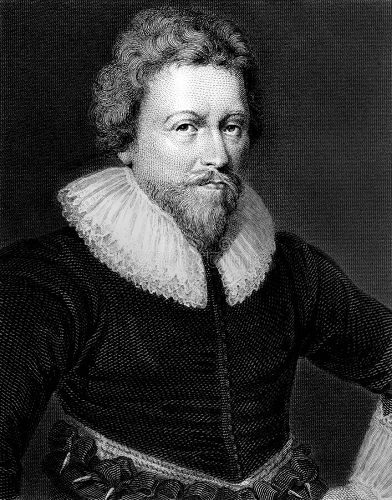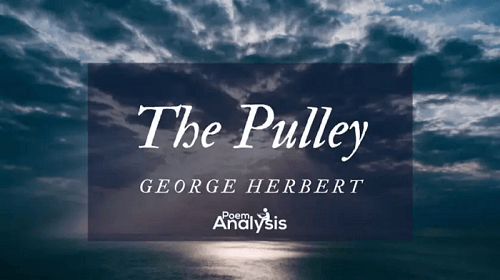The Pulley SummaryIntroductionAs per Christianity, there is a time where God decides to reward humanity, and this is the subject of George Herbert's poem "The Pulley." The poem examines the bond between God and man, his most magnificent creation. The poet used the pulley as an example of how restless people are and why they can never be satisfied. The ultimate parent to humanity, God, utilizes a unique pulley to persuade the man to come back to him. To grasp this idea, think about how a pulley creates force and leverage. To continually entice people back, God maintained the concept of "rest" to himself. But because of this freedom, people are always moving about in pursuit of fulfilment. About The PoetMontgomery, Wales-born George Herbert (1593-1633) is descended from an aristocratic family. Wealthy Aristocrat and Parliamentary member Herbert's father was acquainted with several authors and poets, including John Donne. Later, his mother Magdalen supported and aided John Donne. early George's father passed away, and soon after, Herbert's mother relocated him, his six brothers, and his three sisters to Oxford. Herbert's father too passed very early. Only through his writings could Herbert communicate with his mother, with whom he had a very troubled relationship. He made two significant modifications to his life after the death of his mother. His mother's alma mater, Cambridge, was the first place he cut ties. He knew Jane Danvers for three days before they were wed on March 5, 1629. Uncertainty surrounds their marriage, but by the finish of 1630, he had received his priestly ordination in Bemerton. Herbert was not as well-known as his contemporaries as a poet. He is significant, nonetheless, because he portrayed a stable political and religious environment in his prose during a trying time. His poems are written with a strong sense of religious commitment, impeccable language, fluid metre, and clever use of conceit. His "The Temple" writing earned him the moniker Holy Mr Herbert. 
Theme Of the PoemHerbert was drawn to topics relating to spirituality and human nature. This poetry gives the reader a picture and an understanding of how God gave everyone different characteristics. The speaker talks about these qualities coming from God and being the greatest that humankind has to give. But what God did not give?rest?also had an impact on human nature. Summary Of The PoemStanza 1When God first made man, Having a glass of blessings standing by, "Let us," said he, "pour on him all we can. Let the world's riches, which dispersed lie, Contract into a span." George Herbert talks about the creation of humanity (the first formed man) in the first verse of "The Pulley." With a few modifications, Herbert attempts to retell the biblical account of creation. God's emotions when He decided to create humanity are expressed through him. When God looked at everything He had made, He decided to give everyone "a glass of blessings." Stanza 2So strength first made a way; Then beauty flowed, then wisdom, honor, and pleasure. When almost all was out, God made a stay, Perceiving that, alone of all his treasure, Rest in the bottom lay In "The Pulley," power was the first gift bestowed upon people. In other words, it "made way." Then came beauty, then came intelligence, then honor, and then came pleasure. These are all essential components of human existence. After bestowing man with so many blessings, God chose to keep his rest. The prize found near the bottom of God's cup in this poetry is rest. Rest is a play on words in this context because it can mean both physical relaxation and the sensation of abandonment. provides the current message from God. He decides to "pour on him[humankind] everything we can." In a cup, these "blessings" were merely "standing by" to be applied. The speaker praises all of creation, showering the "world's riches" with all from strength to beauty. They have combined them to create a "span". 
Stanza 3"For if I should," said he, "Bestow this jewel also on my creature, He would adore my gifts instead of me, And rest in Nature, not the God of Nature; So both should losers be. The poet claims in the following five lines that God decided not to give people "rest." He understood full well that if he did, "He (humankind) would love my gifts instead of me." In Herbert's opinion, God made this choice because he didn't want people to spend entire days praising and worshipping nature. Instead, they ought to worship "the God of Nature". To put it another way, both God and man are unsuccessful in their intentions if they worship the gifts instead of God. Stanza 4Yet let him keep the rest, But keep them with repining restlessness; Let him be rich and weary, that at least, If goodness leads him not, yet weariness May toss him to my breast." God orders the guy to preserve his gifts, but because of his rash choices, he is unhappy in every aspect of his life. God planned for the man to continue to be wealthy but worn out. Let these afflictions bring mankind back to God because God's mercy was unable to convince man to love him. We are now back to discussing the pulley which was referenced previously in the poem as a result. ConclusionGod purposefully withheld his promise of rest from man. God is fully aware that ultimately, man would get weary and experience spiritual restlessness as a result of his other blessings. Man will eventually get tired of the physical gifts he has been given. Soon, in their exhaustion and desperation, people will turn to God. Without a doubt, God is both omniscient (all-knowing) and prophetic. Herbert offers prayers that people may be given the ability to make the correct decision and obey God because God created them.
Next TopicThe Rocking Horse Winner Summary
|
 For Videos Join Our Youtube Channel: Join Now
For Videos Join Our Youtube Channel: Join Now
Feedback
- Send your Feedback to [email protected]
Help Others, Please Share









